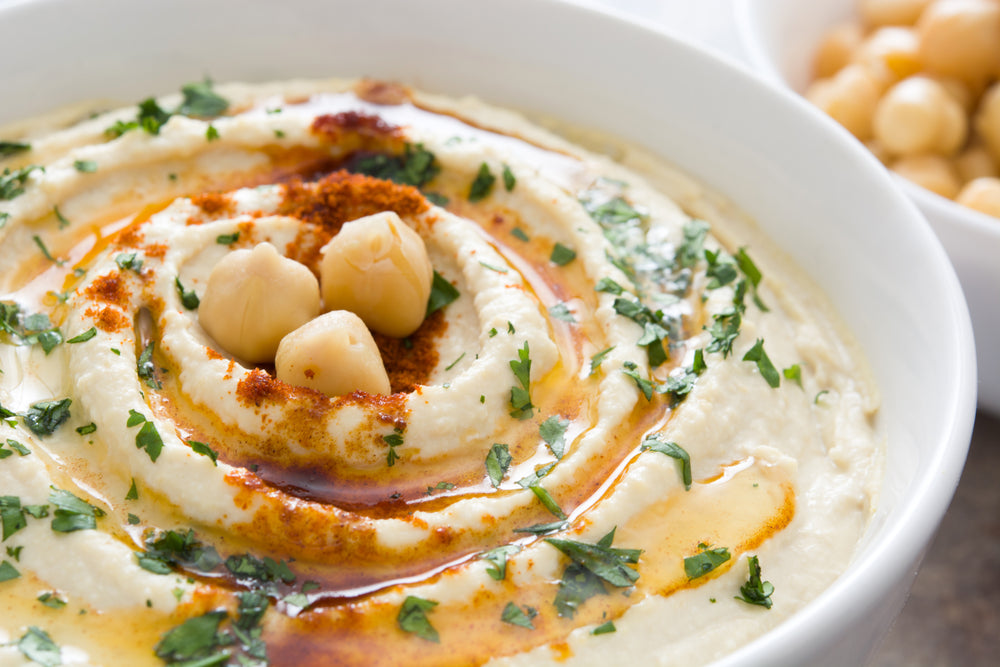I love dipping my carrot sticks in hummus, or using it as a spread in my wraps or sandwiches. What is hummus, you ask? It’s a thick and creamy spread made primarily from chickpeas and a few other healthy ingredients to give you a guilt-free snack.
What Is Hummus?
Hummus is one of the most widely eaten Middle Eastern foods in the U.S. today. As history finds it, hummus was first eaten in Egypt around the 13th century, making it an “ancient” food.
But it is now consumed all over the world, where people in Israel consume it in pretty much every meal, where it’s included in all “mezzeh tables” in Syria and Turkey, and is often eaten for breakfast in Palestine and Jordan. There’s a reason why this food has lasted through all those centuries and can still remain so popular.
Hummus Nutrition Facts
After seeing this list, you’ll see how many nutrients are packed in just a serving of hummus. This is what you’re looking at per 100 gram serving of hummus:
- Protein 5g
- Fiber 5g
- Fat 9g (healthy fats from the olive oil)
- Carbs 20g
- Vitamin C 13% RDA
- Vitamin B6 20% RDA
- Folate 15% RDA
- Iron 10% RFA
- Zinc 10% RDA
- Phosphorus 11% RDA
- Manganese 28% RDA
I don’t think anyone could look at hummus and think anything bad about it. Unless you don’t like the taste of it, then you’re out of luck on that one.
What’s In Hummus?
Chickpeas
Also known as garbanzo beans, they are similar to all beans and legumes in that they are high in protein and fiber, which helps improve digestion and heart health — and helps you feel fuller, longer.

They are also one of the most historical legumes in the world since they have been a part of certain diets for over 7,500 years! Just having an abundance of magnesium, manganese, and vitamin B6 to help reduce common symptoms associated with PMS is good enough for me!
Olive Oil
Olive oil doesn’t only contain healthy fat, but it is especially better in hummus since it is consumed without cooking the oil. Research has shown that olive oil heated to a high temperature can oxidize and become hydrogenated.
Hummus is often made with good quality extra virgin olive oil, so if you decide to make your own, make sure you don’t buy fake olive oil or ones with fillers. The benefits of good olive oil include fighting against cancer, reducing the risk of type 2 diabetes, fighting osteoporosis, and possibly helps prevent skin and breast cancer.
Raw Garlic
Garlic doesn’t only add tremendous flavor to your food, but it contains quite an impressive amount of nutrients including flavonoids, oligosaccharides, selenium, sulfur, fiber, manganese, vitamin B6, iron, and more! Who would have ever thought that something so small can pack so much healthy goodness?
Regularly consuming raw garlic has been proven to help reduce risk with heart disease and various cancers — along with combating sickness, reducing blood pressure or hypertension, and preventing Alzheimer’s disease and dementia.
It also acts as an antifungal, antioxidant, anti-inflammatory, and antiviral.
To further hail garlic as king, it can also detoxify heavy metals in the body. Did we mention it can possibly help you live longer?
Lemon Juice
Who doesn’t like lemons? It’s the basis of the perfect cup of ice-cold lemonade for our hot summers, a great addition to our salad dressings, sauces, drinks, and foods, and makes for an appealing garnish.
Lemon juice has an alkalizing effect on the body, which combats the high level of acidity that is common in most modern diets. It also helps to increase immunity, boosts digestion, and help keep blood sugar levels stable.
Sea Salt
A healthy and traditional hummus will likely use a good quality sea salt to add for flavor instead of processed table salt, which usually is iodized.
Sea salt, especially Himalayan sea salt, has numerous health benefits, containing 60 trace minerals. It also keeps your fluid levels balanced, keeps you hydrated, and provides sodium levels that help balance potassium intake. The best part – it contains important electrolytes and enzymes that help your body absorb nutrients.
Tahini
This is probably the one ingredient in hummus that makes everyone ponder – huh, what is tahini? It is made of ground sesame seeds and is thought to be one of the oldest condiments in the world. They offer a wide range of micronutrients and macronutrients – everything from trace minerals to healthy fatty acids.
Here is a short list of benefits sesame seeds offer:
- Magnesium helps prevent respiratory disorders
- Calcium and zinc encourages bone health
- High zinc content helps produce collagen
- Has antioxidant and anti-inflammatory compound called sesamol to boost heart health
- High fiber content helps digestion
- Contains phytosterols that block cholesterol production
- Full of protein
Tahini is also a great source of amino acids, especially methionine. This allows tahini to create another complete protein when combined with chickpeas.
Health Benefits of Hummus
Basic hummus recipes contain six ingredients: chickpeas, olive oil, garlic, lemon juice, salt, and tahini. I can’t see one bad ingredient in this mix! Mediterranean and Middle Eastern populations have been consuming these types of ingredients for thousands of years, probably because it’s been shown to be anti-inflammatory, in which inflammation is the root cause of many chronic diseases.

Eating a diet similar to these populations can help lower cholesterol and triglyceride levels, reduce the symptom of rheumatoid arthritis, and decrease the risk of developing Alzheimer’s, cancer, heart diseases, and diabetes.
So is hummus healthy? YES! Especially if you make it at home with ingredients you know are fresh and natural. Luckily, there are a dozen ways to spice up your hummus. Some popular ones are roasted garlic, roasted red pepper, cilantro, black bean, eggplant, and Kalamata olive. Just Google some recipes and you’re certain to find many more options to fit your taste buds and mood.
Good Source of Plant-Based Protein
This food is obviously great for vegetarians, vegans, and omnivores too. Since chickpeas are the base of nearly all hummus recipes, this dish is high in protein, which can help you feel fuller, which in turn, keeps you from snacking on junk food (at least we would hope so).
Complete Protein
Because hummus is often eaten with pita bread or another type of whole grain, the chickpeas and grains make up a “complete protein”, meaning they contain all essential amino acids that are necessary for the body to acquire from food and to then use for energy.
Decreases Inflammation
Inflammation is the body’s natural defense to move toxins out of our bodies. But when your body has a high level of inflammation, it means your body has been trying to overcome food, environmental, or medicinal toxins. Foods that help reduce inflammation also helps reduce the risk of getting arthritis.
Luckily, if you’re looking for a highly anti-inflammatory food, you hit the jackpot with hummus. Garlic, olive oil, and chickpeas are all known anti-inflammatory foods.
In a recent study, extracts from garlic were shown to reduce inflammation and help fight wrinkles and aging. For centuries garlic has been used to boost the immune system and cure diseases, and now more studies are being conducted to understand how and what about garlic makes it so effective.

Boost Your Energy
Chickpeas, like all beans and legumes, contain starch. Starch is a complex carbohydrate that the body is able to use steadily for energy. Starches contain natural sugars called glucose, which the body uses easily for many essential functions. Unlike simple sugars found in many products like refined flour, white bread or pasta, soda, candy, and most other processed foods, starches take an extended period of time to break down once consumed.
This means they provide “time released” energy and do not spike your blood sugar in the same way that simple carbohydrates found in processed foods do.
Fights Illness and Disease
Beans and chickpeas, in particular, have been shown to help balance cholesterol levels, reduce hypertension, and to protect against heart disease.
In fact, hummus is commonly eaten in many Mediterranean nations that experience great health, low rates of cardiovascular disease and longevity — Greece and Turkey being two good examples.
This may be due to the high fiber content in chickpeas. This helps prevent people from overeating and gaining harmful excess weight, especially around the organs. Beans also help keep the arteries clear from plaque build-up, decreasing the chances of cardiac arrest and stroke.
Chickpeas are protective properties against colon cancer is due to chickpeas’ ability to keep the digestive system, including the colon, free from harmful bacteria and toxic build-up since the beans’ fiber helps to keep waste moving out of the body quickly.
A diet in rich beans decreases the chance of developing diabetes or insulin resistance. In fact, populations who traditionally ate beans often, but then switched to diets that contained fewer beans, suffered from much higher rates of disease. Once reintroducing beans back into the diet, these populations experienced significantly fewer issues balancing blood sugar.
Tell us what you guys love about hummus!

 Log in
Log in
